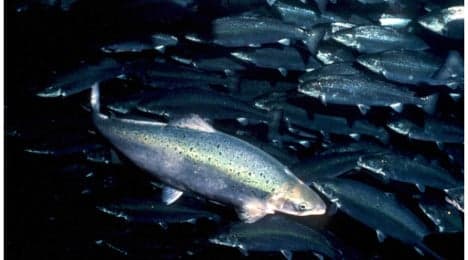Norwegian farmed salmon is safe: report

Farmed Norwegian salmon - repeatedly criticized for its supposed effects on health - can be safely eaten even by pregnant women, a new report by experts said on Monday.
A fixture of Christmas and New Year celebrations in Europe, farmed salmon has become more and more controversial, with a French TV programme last year branding it the "most toxic food in the world".
But health watchdogs tasked by the Norwegian government to investigate the issue say women in particular should eat more of the fish.
"The benefits of eating fish far outweigh the insignificant risk of pollutants and other substances," said Janneche Utne Skaare, of Norway's Scientific Committee for Food Safety (VKM).
"Given the present level of the most dangerous toxins like PCBs, dioxins and mercury, even people who eat a lot of oily or white fish would not absorb them in harmful quantities," Skaare, a biologist and toxicologist, told public broadcaster NRK.
Norway is the world's biggest producer of farmed salmon, and it is one of the country's main export earners after oil.
The Norwegian authorities had previously advised young and pregnant women to limit their consumption of oily fish to two meals a week so as not to expose their children to health risks.
Warning lifted
But that warning on eating salmon, trout, mackerel and herring has now been lifted. In fact, the new VKM report "stresses how important it is for this group to eat fish because it has been proven that mothers eating fish has a positive effect on the development on the nervous system of foetuses and breast-fed babies," said public health chief Knut-Inge Klepp.
According to the new report, farmed salmon now contains 70 percent less dioxins and PCBs than when Norwegian authorities last did major tests in 2006, and levels of mercury have been halved due to changes in what fish are now fed on.
Vegetable oils have largely replaced fish meal and oil which made up for 90 percent of the diet of farmed fish in 1990. The Norwegian research institute Nofima said fish protein now makes up no more than 29 percent of their diet.
Tests by the VKM show that you can eat more than a kilo of farmed salmon a week without risk, Norwegian public health officials maintained.
They recommend that people eat at least two or three fish-based meals a week, or between 300 and 450 grams (10.5-16 ounces), half of which should be oily fish.
Comments
See Also
A fixture of Christmas and New Year celebrations in Europe, farmed salmon has become more and more controversial, with a French TV programme last year branding it the "most toxic food in the world".
But health watchdogs tasked by the Norwegian government to investigate the issue say women in particular should eat more of the fish.
"The benefits of eating fish far outweigh the insignificant risk of pollutants and other substances," said Janneche Utne Skaare, of Norway's Scientific Committee for Food Safety (VKM).
"Given the present level of the most dangerous toxins like PCBs, dioxins and mercury, even people who eat a lot of oily or white fish would not absorb them in harmful quantities," Skaare, a biologist and toxicologist, told public broadcaster NRK.
Norway is the world's biggest producer of farmed salmon, and it is one of the country's main export earners after oil.
The Norwegian authorities had previously advised young and pregnant women to limit their consumption of oily fish to two meals a week so as not to expose their children to health risks.
Warning lifted
But that warning on eating salmon, trout, mackerel and herring has now been lifted. In fact, the new VKM report "stresses how important it is for this group to eat fish because it has been proven that mothers eating fish has a positive effect on the development on the nervous system of foetuses and breast-fed babies," said public health chief Knut-Inge Klepp.
According to the new report, farmed salmon now contains 70 percent less dioxins and PCBs than when Norwegian authorities last did major tests in 2006, and levels of mercury have been halved due to changes in what fish are now fed on.
Vegetable oils have largely replaced fish meal and oil which made up for 90 percent of the diet of farmed fish in 1990. The Norwegian research institute Nofima said fish protein now makes up no more than 29 percent of their diet.
Tests by the VKM show that you can eat more than a kilo of farmed salmon a week without risk, Norwegian public health officials maintained.
They recommend that people eat at least two or three fish-based meals a week, or between 300 and 450 grams (10.5-16 ounces), half of which should be oily fish.
Join the conversation in our comments section below. Share your own views and experience and if you have a question or suggestion for our journalists then email us at [email protected].
Please keep comments civil, constructive and on topic – and make sure to read our terms of use before getting involved.
Please log in here to leave a comment.